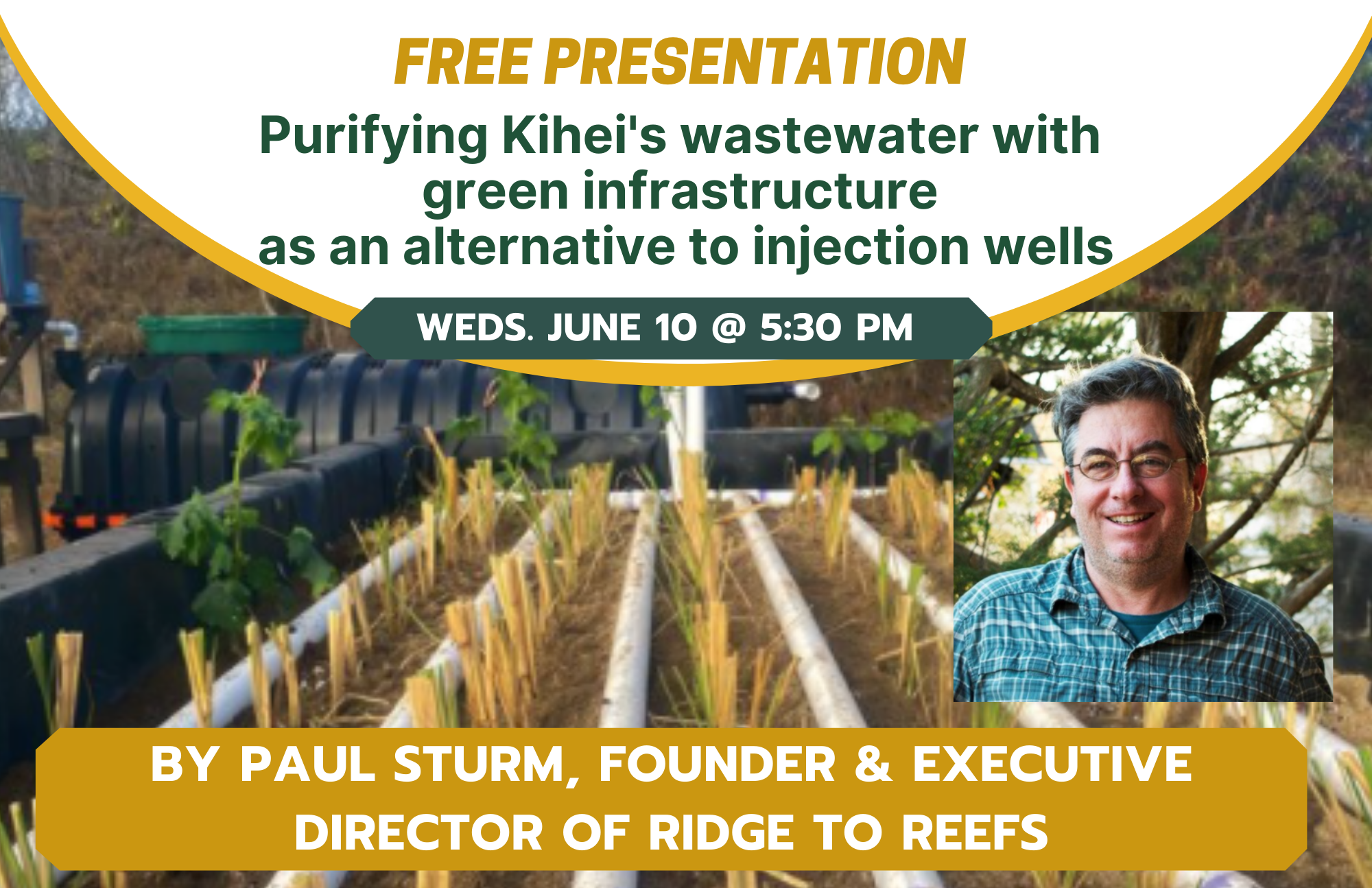Free presentation on “Purifying Kihei’s Wastewater with Green Infrastructure as an Alternative to Injection Wells”

- This event has passed.
Free presentation on “Purifying Kihei’s Wastewater with Green Infrastructure as an Alternative to Injection Wells”
June 9, 2021 @ 5:30 pm - 6:30 pm
Free
Three new low cost, low energy, pilot green infrastructure systems that will be constructed in Kihei this summer to purify water coming out of the Kihei Wastewater Reclamation Facility will be the topic of a free Zoom presentation by Paul Sturm, Executive Director of Ridge to Reefs, on Wednesday, June 9 at 5:30 pm. This new system will harness the power of plants, soil and microbial activity to purify wastewater to approach drinking water standards, dramatically expanding its potential uses and reducing the need for disposal via injection wells.
This talk will be presented via Zoom as part of Maui Nui Marine Resource Council’s monthly “Know Your Ocean Speaker Series.” These monthly virtual events are supported by the County of Maui Mayor’s Office of Economic Development.
To reserve your spot, please visit https://bit.ly/KiheiWastewater.
Sturm will be presenting plans for the three new Kihei Wastewater Disposal Pilot projects that Ridge to Reefs will construct this summer with support from support from National Fish and Wildlife Foundation and assistance from John Astilla, founder and owner of Sunshine Vetiver Solutions and construction support from Ali’i Farm Service. The pilot projects will be aesthetically pleasing and odor-free, bearing a closer resemblance to gardens rather than treatment facilities.
“Through natural processes, we will reduce the amount of wastewater that needs to be disposed of; any remaining wastewater will come as close as possible to drinking water standards, expanding opportunities for its re-use,” says Sturm. “Our Ridge to Reefs Kihei Wastewater Disposal Pilot will be up and running within two months, ready to demonstrate the effectiveness of Ridge to Reef’s nature-based solutions as viable, affordable alternatives to groundwater injection disposal.”
“We believe this system has the potential to reduce land-to-sea pollution from wastewater, to benefit Maui’s local coral reefs,” says Sturm.
Ridge to Reefs (RTR) is a nonprofit 501(c)(3) formed in 2011 to help protect and restore coastal and coral reef ecosystems by reducing land-to-sea pollution with green infrastructure. The organization uses natural methods and innovative engineering to solve pressing environmental and social problems. Their expertise includes treating polluted storm and wastewater by establishing green infrastructure solutions such as constructed wetlands, rain gardens and bioreactors. Using proven natural methods and state-of-the-art engineering, Ridge to Reefs has installed systems in Maryland, Virginia, Puerto Rico, Palau and American Samoa. To learn more, visit https://www.ridgetoreefs.org/
The event’s emcee will be Darla Palmer-Ellingson, local radio show host of the public affairs program, Island Environment 360 Maui’s only commercially broadcast public affairs show on environmental and related Hawaiian cultural topics, aired on the stations of H-Hawaii Media.
“As a nonprofit working for healthy coral reefs and clean ocean water, Maui Nui Marine Resource Council is extremely proud to host this presentation, as our community works on solutions to reduce pollution to our nearshore waters, to help our coral reefs survive,” says Mike Fogarty, Executive Director of Maui Nui Marine Resource Council. “We are happy to see this innovative science-based pilot project come to Kihei, to use natural materials to better treat wastewater and reduce its pollution impacts on our ocean waters.”
To reserve your spot at this free Zoom webinar, please visit https://bit.ly/KiheiWastewater.
About Paul Sturm:
Paul founded Ridge to Reefs (non-profit organization) in 2011 to support local creation and implementation of watershed plans primarily in the Chesapeake Bay and in coral reef watersheds – with the goal to achieve tangible environmental outcomes.
Paul and his team are currently testing a low cost, low energy, nature-based alternative septic system with University of Hawaii and have constructed similar systems in Puerto Rico and American Samoa. He has worked on innovative methods to control sediment transport using vegetation and stormwater using plants and biochar amendments. Recent efforts have also focused on improving food security, soil health and agricultural resilience in the face of climate change.
Paul is a former Center for Watershed Protection Director/Biologist and spent 11 years working on watershed plans, implementation projects and code changes in the Chesapeake Bay watershed and around the country. Prior to that, he spent 6 years researching the effectiveness of implementation of agricultural and urban BMP’s and developed methods to track and target pollution source areas in agricultural watersheds.
Paul participated in the development of the EPA Sponsored Illicit discharge detection manual. He directly assisted the development of field assessment protocols for the Outfall Reconnaissance Inventory (ORI) and the development of the field form as well as the water chemistry testing protocol that was developed for the manual. The manual was produced for EPA and distributed to officials in all 50 states to help guide NPDES compliance methods for Phase I and Phase II communities. Paul also helped conduct a webcast for EPA that included over 1000 attendees. Paul conducted the field portion of the training where videos of the outfall reconnaissance inventory methods were presented for several outfalls. Paul also answered technical questions from participants in the webcast.
Paul has contributed to more than 20 publications and has presented more than 60 lectures around the U.S., Canada and the Caribbean. These include participation as a trainer at four National Watershed Institutes, invited speaker at four US Coral Reef Task Meetings in Washington, D.C. and San Juan, Puerto Rico, three National River Rallies, three Army Corp of Engineers Water in the Watersheds Courses in Davis, CA and a Coastal Zone Management Course for the Institute of Marine Affairs in Trinidad and Tobago. Paul has led trainings in stream assessment, stormwater retrofitting, erosion, code change, illicit discharge detection and elimination, and sediment and erosion control.


